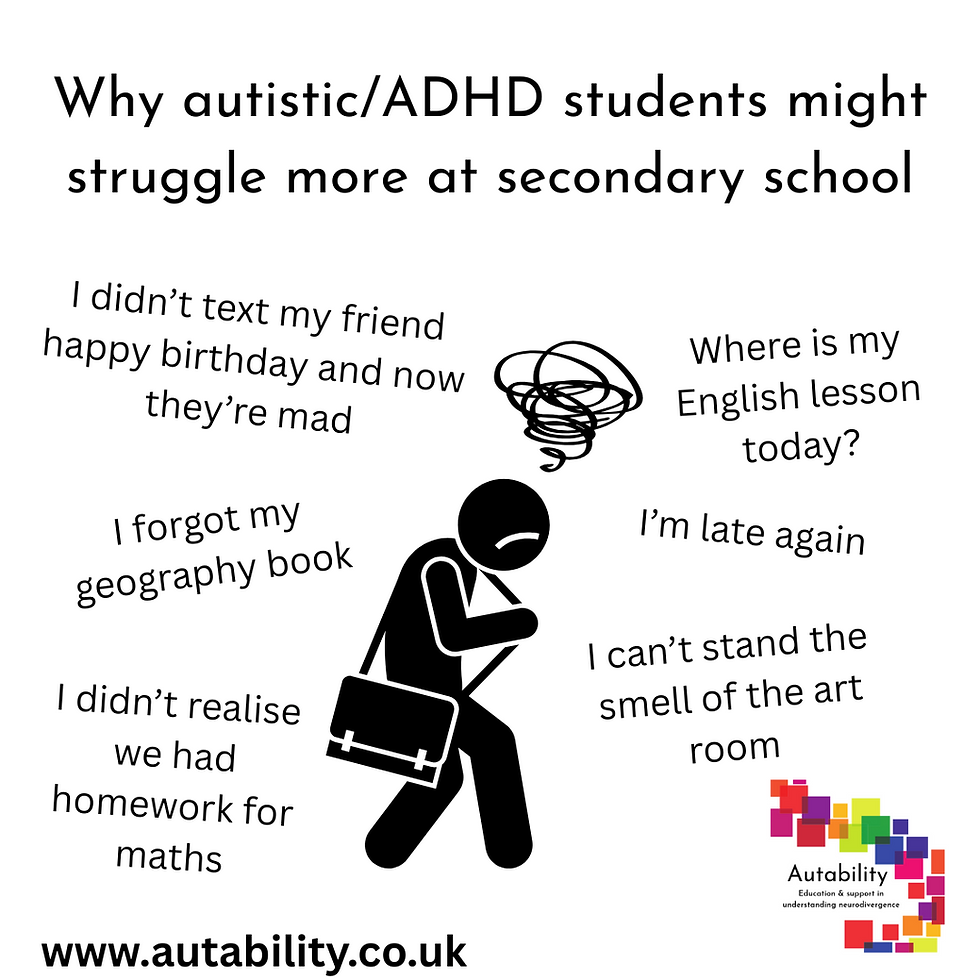Why Autistic/ADHD students find secondary school more challenging
- Aug 4, 2025
- 3 min read

The transition to secondary school marks a significant turning point for many autistic young people, particularly when it comes to executive function skills. If you've noticed your child struggling more with organisation, time management, or completing tasks since starting secondary school, you're not alone. This increased difficulty isn't a sign of regression or failure, it's a predictable response to the dramatically different demands of secondary education.
Executive function involves all the mental skills that help us plan, focus, remember instructions, and juggle multiple tasks successfully. For autistic individuals, these skills often develop differently and often need more conscious effort to use properly. I remember once being told that executive function is the brain's "air traffic control system" coordinating and managing all the different cognitive processes needed to navigate daily life. We all know the carnage that an issue with air traffic control can cause!
Unlike most primary schools, where students usually have one classroom and one teacher, secondary school means different teachers, classrooms, and routines. This can be a lot to handle for students still developing their organisation and planning skills. This is a challenge for all students, but can be much more of a challenge for those with ADHD and/or autism.
On top of this, the physical environment itself becomes more complicated. Students must navigate larger buildings, remember locker combinations, and move between different classrooms throughout the day. Each classroom may have different rules, expectations, and sensory environments. This constant environmental shifting requires a lot of mental energy just to adapt and re-set.
The academic structure also becomes far more demanding. Instead of having one teacher who understands their learning style and needs, students now interact with six or more different teachers, each with their own communication style, expectations, and subject-specific demands. Homework assignments come from multiple sources with varying due dates, and students are expected to independently track and manage these competing deadlines, often once they are home from school and need time to recover from the day.
Secondary school dramatically increases this pressure with larger peer groups, noisier hallways, more complex social hierarchies, and greater expectations for independence. When cognitive resources are already exhausted by managing sensory input and social situations, there's less mental energy available for executive function tasks (organising, planning etc).
Secondary school expects students to become more independent just as the demands become more complex. Teachers assume students can remember homework without constant reminders, organise their materials independently, and plan long-term projects without support. For autistic students who may need more structure and support, this sudden expectation of independence can feel overwhelming.
Many autistic young people have learned to rely on external structures and supports to manage their executive function needs. When these supports are suddenly reduced or removed, they may struggle significantly. This isn’t because they're incapable, but because they haven't yet developed internal systems to replace the external ones. They need time to figure out how they will keep track of deadlines, how to communicate with different teachers and even what to pack in their school bag each day. This takes time and is gradual, it isn’t going to suddenly happen one morning when you walk through the gates to secondary school.
Remember that executive function skills continue developing well into the twenties for all young people, and autistic people may follow a different timeline. The struggles your child experiences in secondary school does not predict their future success. They simply show areas where additional support and understanding are needed.
With patience, appropriate supports, and recognition that this is a developmental process rather than them lacking a skill everyone else seems to have, most autistic young people can learn to navigate the demands of secondary school successfully. The key is working with their neurodevelopment rather than against it. This means building on their strengths while providing support for areas that cause them a greater challenge.
If you want help and support, have a teen at secondary who is struggling, or a child who is about to start secondary school, we have lots of resources to help you. Many of them are free! Check out what we have got below or visit our website pages for more information on autism and ADHD at school here.
.png)



Comments